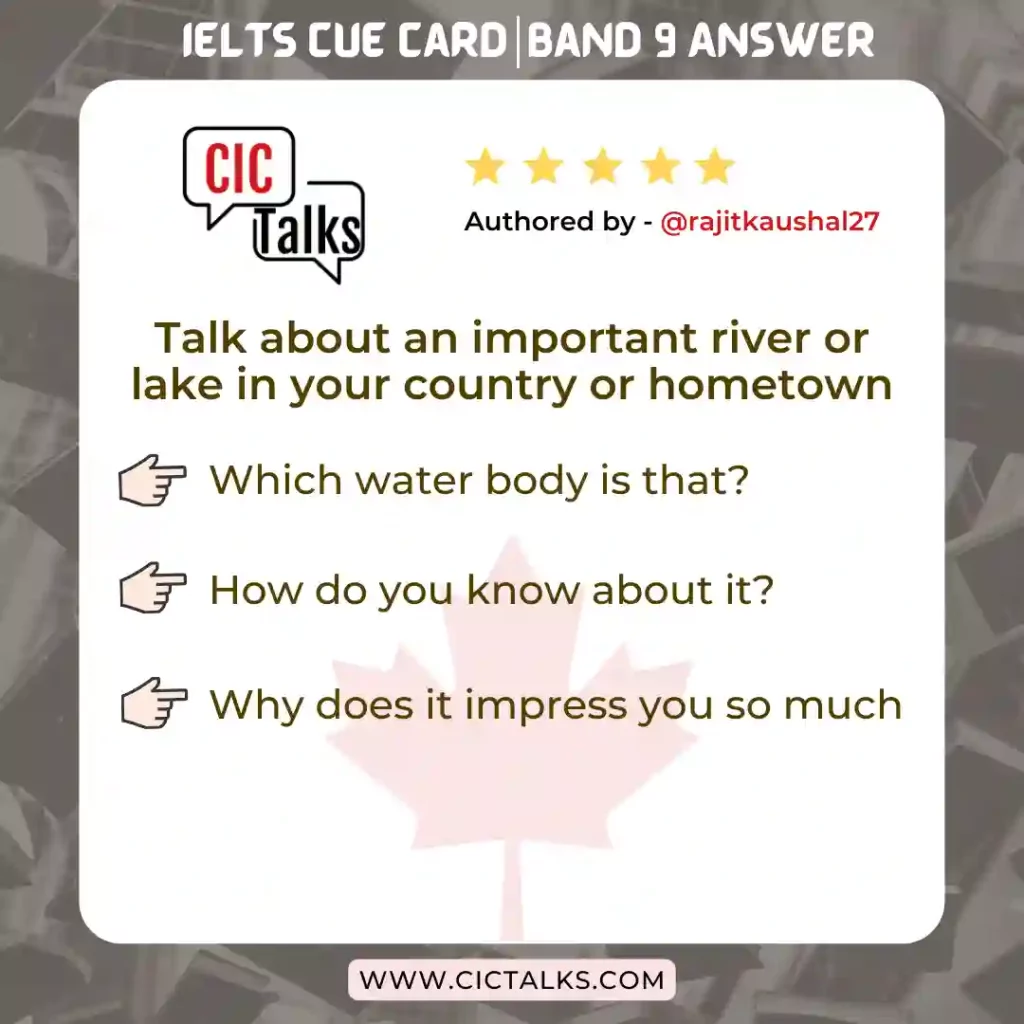[7+] Talk about an important river or lake in your country or hometown IELTS Cue-Card
In Talk about an important river or lake in your country or hometown Cue Card, you should say:
- Which water body is that?
- How do you know about it?
- Why does it impress you so much?

Here are the band 7+ sample answers to Talk about an important river or lake in your country or hometown IELTS Speaking Cue Card:
Sample Answer 1
Introducing an important river or lake
- India is a country with several rivers and lakes. Its geographical area is traversed by a plethora of large and small rivers.
- In fact, water bodies are essential to our survival. It is hardly an overstatement to say that rivers and lakes are the heart and spirit of Indian life.
- So today, I would love to throw light on an important, magnificent lake in my country.
Which water body is that?
- I am talking about Pangong lake. It is the world’s highest saltwater lake situated at a height of almost 4,350m.
- One of Leh Ladakh’s most famous lakes, it gets its name from the Tibetan word “Pangong Tso,” which means “high grassland lake.”
- Pangong Lake is over 160 kilometres long, with one-third in India and the other two-thirds in China.
How do you know about it?
- My elder brother once told me about Pangong lake.
- So we went there last week and were blessed with a clear sunny day that reflected the skies in the lake in various shades of blue.
- It is mesmerising to sit on the shore of this gorgeous lake. Observe the steady flow of water against a stunning backdrop of rocky mountains and snowcapped mountains.
Why does it impress you so much?
- To be honest, it is a visual pleasure to be at this lake and no words can justify its beauty.
- Its water, which appears to be coloured blue, contrasts sharply with the barren mountains that surround it.
- Actually, we went in the 2nd week of May and were fortunate to find so much snow on the entire route to this lake.
- I was told that the snow melts during June. So we were fortunate to have a fantastic journey to this fantastic destination.
- We were even lucky to witness snowfall for about one hour during our return.
- Believe me, you may spend hours contemplating its beauty and still not be satisfied.
Concluding the Cue Card
- Pangong Lake is also known to change colours, appearing blue, green and red at different times. It is a surreal experience to be in front of the lake with unbelievable colour.
- If you have decided to go on a trip to Ladakh anytime soon, I would highly recommend you to visit Pangong Lake.
Sample Answer 2
India is a country full of rivers and lakes. In my country, there are hundreds of water bodies that are incredibly essential. The Ganges, or Ganga as we call it in India, is an important river that I’d want to discuss today.
I recall learning about it at the time. I was in fifth grade. In Geography class, there was a lecture about significant Indian rivers. However, I learned the most of what I know about the Ganga in later years.
Now I can confidently claim to know every detail about this river. For example, it flows from the glaciers of the Himalayas into the Bay of Bengal. The Ganges is also known as a perennial river because its water is available all year.
It gets its water from two sources: glaciers in the Himalayas and rain during the monsoon season. The river is noteworthy for a variety of reasons, the first of which is its length. It is one of the world’s longest rivers.
Many individuals rely on it as a source of income. Farmers utilise it for irrigation, and people fish in it as well. Furthermore, the Ganga River is considered sacred, and numerous Hindu festivities are held on its banks.
Finally, I believe that no other river or lake in my country or hometown is as essential as the Ganges.
Follow-ups
Following are the probable Talk about an important river or lake in your country or hometown follow up questions that may be asked by the examiner in Speaking Part-3 of the test:
1. Why do many people like going to places with water such as lakes, rivers, or seas?
Personally, I find the water to be very soothing and calming. I think most people are drawn to lakes, rivers, or seas to break the monotony in their lives. The immeasurable sense of peace that we feel around water gives us a chance to escape the hyper-connected, over-stimulated state of modern-day life.
2. What kinds of leisure activities do people like to do in water places?
There are actually tonnes of leisure activities that people could try near the seashore. For instance, each year more people are attracted to the sports of Swimming, Fishing, Scuba diving, Boating, Water skiing, and Parasailing. Waterbodies also provide a place for recreation.
3. Do children and old people relax in the same way when they go to the beach?
Both children and older people relax in their own ways when they’re at some beach. For example, children would like to build a sandcastle, have a scavenger hunt, or pack a ball and play beach soccer or kickball to unwind. Whereas, old people spend time with themselves and relax by reading a book or just laying on the beach.
4. Why do people like water sports?
Water’s calming effect relieves tension, anxiety, and depression. That’s the reason why many people are turning toward water sports. Swimming, for example, has been shown to increase mood in both men and women. Plus, water sports are excellent forms of exercise that improve both the body and the mind.
5. Do you think beach or seaside is more suitable for children or old people to spend their leisure time with?
I think beaches are suitable for both children and older adults to spend their leisure time if due procedures are being followed. For example, we should always swim between the red and yellow flags to prevent any accident.
6. Is there much water transportation in your country?
Transportation has always been a topic of prime concern in the Indian context. India has 14,500 km of navigable waterways, contributing about 1% to the country’s transportation. It comprises rivers, canals, backwaters, creeks, etc. At present, 5,685 km of major rivers are navigable by mechanised flat bottom vessels.
7. Do people travel by boat in your country?
Although travelling by boat is not that prevalent in North India, there are some boats that operate in the Southern part of the country. Andaman is among one of the most breathtaking cruise vacations in India
8. How important is water in daily life?
Water is the basis of life. Without it, most people cannot even last a day.
- It protects our heart. Drinking plenty of water could help prevent heart attacks.
- Gives our brain a boost. Water provides the brain with much-needed O2 to perform at optimum levels everyday.
- Helps us lose weight. Drinking water has the ability to increase our metabolic rate, thus helping your body to trim the fat.
9. How important are rivers and lakes to the cities where they located?
Rivers are critical for fresh drinking water, people’s livelihoods, and wildlife. Unfortunately, they are still under threat. For people and wildlife to survive, we must commit to restoring freshwater biodiversity, restoring natural river flows, and cleaning up dirty water.
10. Are the rivers in your country suffer from serious pollution?
Unfortunately, Yes! The Central Pollution Control Board (CPCB) has identified 351 polluted river stretches in India. Sewage, garbage and waste from households, agricultural farms and industries are dumped into rivers on a very large scale. Therefore, some Indian rivers suffer from life-threatening pollution levels.
11. Do you think human activity is posing a threat to oceans globally?
I think no part of the ocean has today completely escaped the impact of human pressures, including the most remote areas. Overfishing, habitat loss, the introduction of exotic species, ocean pollution, acidification, and warming are all effects of human activity on marine life and environments.
FAQs
People enjoy visiting such locations since they may participate in a variety of activities while having a good time. They can go swimming, boating, rafting, surfing, snorkelling, and scuba diving, among other activities. In addition, India has a large coastline. People may readily find such areas, therefore they have become popular tourist destinations.
People can do all kinds of leisure activities in water places. They can go swimming, boating, rafting, surfing, snorkelling, and scuba diving, among other activities.
No, kids relax in different ways depending on their age. The elderly simply sit and observe their children and grandchildren playing in the surf. Children run about the beach, play beach volleyball, swim, splash in the ocean, and sweat out their energy to rest.
Water activities are popular because they are enjoyable, especially during the long summer months. For people who do not live near the ocean or other bodies of water, such sites are a novelty, and hence entertaining and thrilling.
It is, indeed. They should, however, avoid venturing near water during high tide. Beaches with a lot of people are often safer than those that are remote.
I live in northern India. There is no water transportation here, however, there is a long coastline to the south where water transit is fairly prevalent.
Yes, Short distances are travelled by boat by residents of coastal locations.
Water is the basic foundation of life. It’s as simple as that: without water, there is no life. That is why, after space exploration is completed, the first item to be discovered are evidence of water. Otherwise, no one can live there.
Water bodies are critical. They provide a source of income for fishermen. These bodies of water draw tourists, which boosts the local economy.
Yes, pollution of these bodies of water is a major issue. That is why the Indian government has begun a huge campaign to save the Ganges.
Without a doubt. People are throwing garbage into the waters. Industries pour untreated effluent into the oceans. Then there are the occasional oil spills.
————
————
I hope it gives you some realistic idea on how to carry a conversation around Talk about an important river or lake in your country or hometown IELTS Cue card topic. However, it is strongly advised not to reproduce the same answer during the exam, as it may be used by many of our readers on the site. You should rather reformulate and personalize your answer.
If you still have any doubts, post them in the comments.
ALL THE BEST !


![IELTS Speaking Part 1 [TEXT MESSAGING, SPORTS, RECYCLE]](https://cictalks.com/wp-content/uploads/2021/08/ielts-speaking-text-messaging-sports-recycle-part-1-390x205.jpeg)
![Describe a street market in your city [IELTS Cue Card]](https://cictalks.com/wp-content/uploads/2021/05/Describe-a-street-market-in-your-city-ielts-speaking-cue-card-390x205.jpg)